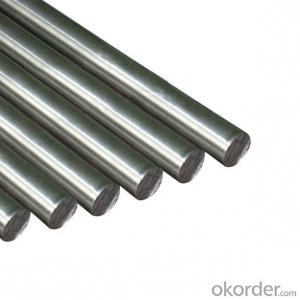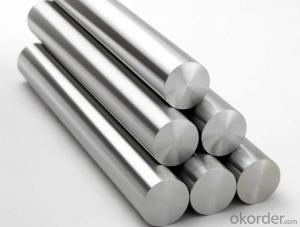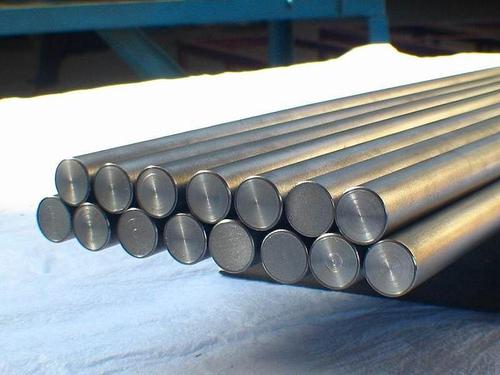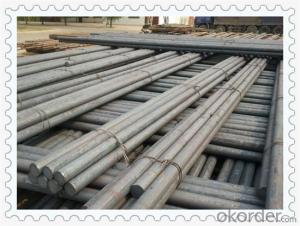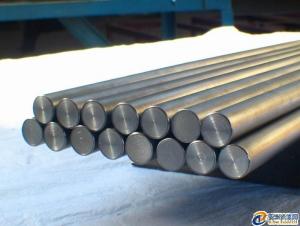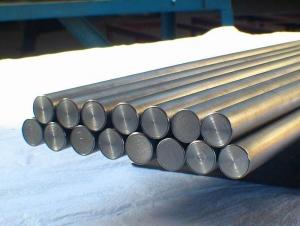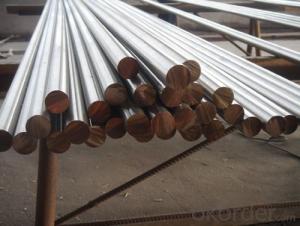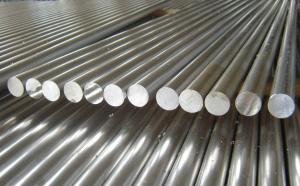High Quality Round Bar 5-28mm Hot Rolled GB Q235 Q195
- Loading Port:
- China Main Port
- Payment Terms:
- TT or LC
- Min Order Qty:
- 25 m.t.
- Supply Capability:
- 100000 m.t./month
OKorder Service Pledge
OKorder Financial Service
You Might Also Like
Product Applications:
1) Suitable for making various strong cutting tool abrasion resistance, impact resistance.
2) Used to produce all kinds of high hard and super hard saw blade, drill, tap, broach, gear hob and various kinds of milling cutter.
3) Used for advanced punching die, screw die, and the toughness and complicated shape of the punch, etc.
4) Is used for cold forging die and drawing mode, etc.
5) Recommended watchcase factory, screw factory and other cold stamping products industry use.
Product Advantages:
OKorder's High Quality Round Bar 5-28mm Hot Rolled GB Q235 Q195are durable, strong, and resist corrosion.
Main Product Features:
· Premium quality
· Prompt delivery & seaworthy packing (30 days after receiving deposit)
· Corrosion resistance
· Can be recycled and reused
· Mill test certification
· Professional Service
· Competitive pricing
Product Specifications:
1. Grade: GB, JIS, ASTM, EN
2. Grade: Q235, SS400, A36, S235JR
3. Diameter and mass: As below
Diameter | Mass | Diameter | Mass | Diameter | Mass |
(mm) | (kg/m) | (mm) | (kg/m) | (mm) | (kg/m) |
6 | 0.22 | 22 | 2.98 | 53 | 17.30 |
7 | 0.30 | 24 | 3.55 | 56 | 19.30 |
8 | 0.40 | 25 | 3.85 | 60 | 22.20 |
9 | 0.50 | 26 | 4.17 | 63 | 24.50 |
10 | 0.62 | 28 | 4.83 | 65 | 26.00 |
11 | 0.75 | 30 | 5.55 | 70 | 30.20 |
12 | 0.89 | 32 | 6.31 | 75 | 34.70 |
13 | 1.04 | 34 | 7.13 | 80 | 39.50 |
14 | 1.21 | 36 | 7.99 | 85 | 44.50 |
15 | 1.39 | 38 | 8.90 | 90 | 49.90 |
16 | 1.58 | 40 | 9.86 | 95 | 55.60 |
17 | 1.78 | 42 | 10.90 | 100 | 61.70 |
18 | 2.00 | 45 | 12.50 | 120 | 88.85 |
19 | 2.23 | 48 | 14.20 | 140 | 120.93 |
20 | 2.47 | 50 | 15.40 | 150 | 138.82 |
4. Material: Mild Steel
5. Heat treatment of high quality steel:
Fire: Isothermal annealing temperature is 800 ~ 880 °C, with 10 ~ 20 °C, the furnace cooling to about 600 °C, hardness above HB269.
Preheat temperature: 730-730 °C
Quenching temperature: 1190-1210 °C
Tempering temperature: 540-595 °C
Cold drawn, hardness 285 HBS
Cold drawn after annealing condition, hardness 277 HBS
Quenching methods: oil quenching, air cooling or salt bath quenching
FAQ:
Q1: Why buy Materials & Equipment from OKorder.com?
A1: All products offered byOKorder.com are carefully selected from China's most reliable manufacturing enterprises. Through its ISO certifications, OKorder.com adheres to the highest standards and a commitment to supply chain safety and customer satisfaction.
Q2: How do we guarantee the quality of our products?
A2: We have established an advanced quality management system which conducts strict quality tests at every step, from raw materials to the final product. At the same time, we provide extensive follow-up service assurances as required.
Q3: How soon can we receive the product after purchase?
A3: Within three days of placing an order, we will begin production. The specific shipping date is dependent upon international and government factors, but is typically 7 to 10 workdays.
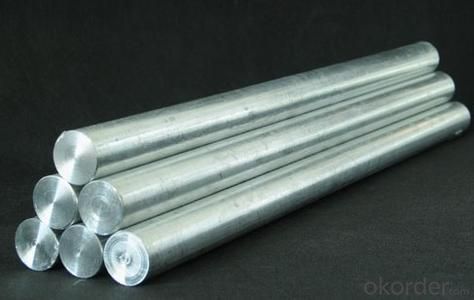
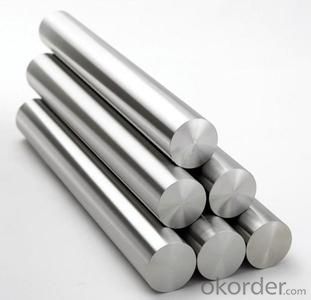
- Q: Can steel round bars be used in outdoor applications?
- Yes, steel round bars can be used in outdoor applications. Steel is a durable and corrosion-resistant material, making it suitable for various outdoor environments. However, it is essential to choose the right type of steel and apply appropriate protective coatings to ensure long-term performance and prevent rusting.
- Q: What are the different types of steel round bars used in the automotive chassis components?
- There is a wide range of steel round bars commonly employed in automotive chassis components. These bars are selected based on their unique properties and performance criteria for different parts of the chassis. 1. Mild Steel Round Bars: Automotive chassis components often utilize mild steel round bars due to their well-balanced combination of strength, durability, and cost-effectiveness. These bars find application in various chassis parts such as brackets, supports, and reinforcements. 2. High-Strength Low-Alloy (HSLA) Steel Round Bars: HSLA steel round bars are crafted by combining low carbon content with small quantities of alloying elements like manganese, phosphorus, and chromium. This steel variant offers superior strength and enhanced formability compared to mild steel. Chassis components that demand critical performance, such as control arms, suspension components, and steering linkages, frequently incorporate HSLA steel round bars. 3. Boron Steel Round Bars: Boron steel round bars are renowned for their exceptional strength and resistance to deformation. These bars are alloyed with boron, which imparts high hardenability and toughness to the steel. Safety-critical chassis components like reinforced door beams and crash structures primarily employ boron steel round bars. 4. Stainless Steel Round Bars: Stainless steel round bars exhibit corrosion resistance alongside excellent strength and durability. While they are not as commonly employed in automotive chassis components, stainless steel round bars may be utilized in specialized parts that necessitate resistance to rust and corrosion, such as exhaust system components or parts exposed to harsh environmental conditions. 5. Alloy Steel Round Bars: Alloy steel round bars are produced by incorporating various alloying elements like nickel, chromium, and molybdenum to enhance specific properties such as strength, hardness, and wear resistance. These bars frequently find application in high-performance chassis components like drive shafts, axles, and gears. To summarize, the types of steel round bars utilized in automotive chassis components encompass mild steel, high-strength low-alloy steel, boron steel, stainless steel, and alloy steel. The selection of the appropriate type depends on the specific requirements of each component, including strength, durability, formability, and corrosion resistance.
- Q: Can steel round bars be used in corrosive environments?
- The suitability of steel round bars in corrosive environments depends on the specific type of steel and the severity of the corrosion. For instance, stainless steel round bars are well-known for their excellent resistance to corrosion and are widely used in corrosive environments like marine applications, chemical processing plants, and wastewater treatment facilities. These bars are typically alloyed with elements such as chromium and nickel, which create a protective layer on the surface of the steel, preventing corrosion. On the other hand, carbon steel round bars are more susceptible to corrosion and may not be appropriate for highly corrosive environments unless they are properly coated or treated. In such situations, it is crucial to seek advice from experts or engineers to select the right steel grade and take necessary precautions to ensure the durability and performance of steel round bars in corrosive environments.
- Q: What's the difference between round steel and other steel bars?
- Strength is not the same. The low strength steel, and other steel with high strength, the diameter of the same size as compared with other steel, round steel can bear the pulling force than other reinforced small, but the plastic steel reinforced bar is stronger than the other, there is a large deformation in the break before, while the other bars in tensile deformation is the former is much smaller.
- Q: Can steel round bars be used in the manufacturing of home decor?
- Certainly, steel round bars can be utilized in the production of home decor items without a doubt. These versatile and sturdy materials can be molded, joined together, and altered into numerous shapes and patterns. They lend themselves to the creation of ornamental pieces like candle holders, wall art, sculptures, furniture embellishments, and so forth. Depending on the desired interior design style, steel round bars can be polished, painted, or left in their natural state. Moreover, steel, being a robust and enduring substance, is perfect for home decor objects that require resilience against frequent usage and the ability to uphold their aesthetic appeal over an extended period.
- Q: Are steel round bars susceptible to corrosion?
- Corrosion is a common issue for steel round bars, especially when they come into contact with moisture, oxygen, and certain chemicals. The degradation of the material occurs when the metal reacts with its surroundings. Steel, primarily composed of iron, can undergo different types of corrosion, including general corrosion, pitting corrosion, and stress corrosion cracking. When steel round bars are exposed to moisture and oxygen, they can experience general corrosion. This gradual deterioration manifests as the formation of an oxide layer on the surface, resulting in material loss and reduced strength over time. Pitting corrosion is another type that steel round bars may encounter. It involves localized damage on the metal's surface, leading to the creation of small pits. These pits can deepen and expand, compromising the structure and integrity of the bars. Stress corrosion cracking is a specific form of corrosion that affects steel round bars under tensile stress, in the presence of particular corrosive agents. This phenomenon can cause sudden material failure, even when stress levels are below the bars' yield strength. To combat corrosion, protective coatings and corrosion inhibitors are commonly applied to steel round bars. Methods like galvanization, where a layer of zinc is added, or the use of epoxy or paint coatings are often employed. Regular maintenance and proper storage practices are also important in preventing excessive exposure to corrosive elements. It is worth noting that the susceptibility to corrosion can vary depending on the grade and composition of the steel used for the round bars. Certain types of stainless steel, for instance, exhibit higher resistance to corrosion due to the presence of chromium and other alloying elements. In conclusion, while steel round bars can be vulnerable to corrosion, appropriate preventive measures can be implemented to minimize the risk and prolong their lifespan.
- Q: Are steel round bars suitable for outdoor applications?
- Indeed, outdoor applications find steel round bars to be highly suitable. The remarkable durability and strength of steel have established it as a preferred option for numerous outdoor structures and applications. Construction, fencing, gates, outdoor furniture, and other outdoor structures frequently rely on steel round bars owing to their ability to withstand corrosion and weathering. Moreover, the resistance of steel round bars against outdoor elements can be further fortified through painting or coating.
- Q: What is the maximum temperature a steel round bar can withstand?
- The maximum temperature that a steel round bar can withstand depends on the specific grade and composition of the steel. Generally, most steel alloys can withstand temperatures up to around 1200°C (2200°F) before experiencing significant structural changes or loss of strength. However, it is always recommended to consult the manufacturer's specifications or engineering data for the specific steel alloy in question to determine its maximum temperature tolerance.
- Q: How do I calculate the length of a steel round bar based on weight?
- In order to determine the length of a steel round bar based on its weight, there are a few factors to consider. Firstly, you must be aware of the density of steel, which typically ranges around 7850 kilograms per cubic meter. However, it's worth noting that this value can vary depending on the specific type and grade of steel being utilized. After obtaining the density value, the next step involves converting the weight of the steel round bar into kilograms if it is initially given in a different unit. For instance, if the weight is provided in pounds, you can multiply it by 0.4536 to convert it into kilograms. Once you have successfully converted the weight into kilograms, you can proceed with using the following formula to calculate the length: Length = Weight / (Density * π * (Diameter/2)^2) It's important to ensure that the diameter is measured in meters. If the diameter is given in a different unit, it must be converted accordingly. Additionally, the symbol "π" represents the mathematical constant pi, which is approximately equal to 3.14159. By substituting the appropriate values into the formula, you will be able to accurately determine the length of the steel round bar. Remember to maintain consistent units throughout the calculation to yield precise results. Please bear in mind that this calculation assumes the round bar possesses a consistent diameter along its entire length. If the bar exhibits varying diameters or irregularities, the resulting length may be an approximation rather than an exact measurement.
- Q: What is the difference between a hot-rolled and a cold-drawn steel round bar?
- The main difference between a hot-rolled and a cold-drawn steel round bar lies in the manufacturing process. Hot-rolled steel round bars are formed by heating and rolling the steel at high temperatures, resulting in a rougher surface finish and less precise dimensions. On the other hand, cold-drawn steel round bars are formed by pulling the steel through a die at room temperature, resulting in a smoother surface finish and more precise dimensions. Cold-drawn steel round bars also tend to have improved mechanical properties and a higher strength-to-weight ratio compared to hot-rolled steel round bars.
Send your message to us
High Quality Round Bar 5-28mm Hot Rolled GB Q235 Q195
- Loading Port:
- China Main Port
- Payment Terms:
- TT or LC
- Min Order Qty:
- 25 m.t.
- Supply Capability:
- 100000 m.t./month
OKorder Service Pledge
OKorder Financial Service
Similar products
Hot products
Hot Searches
Related keywords

